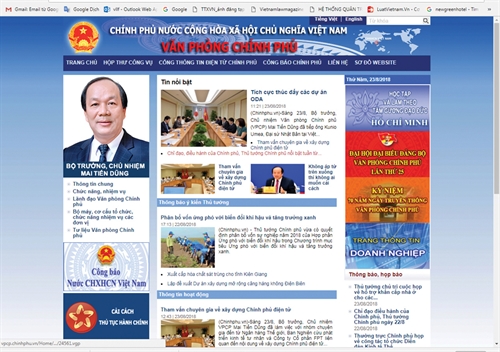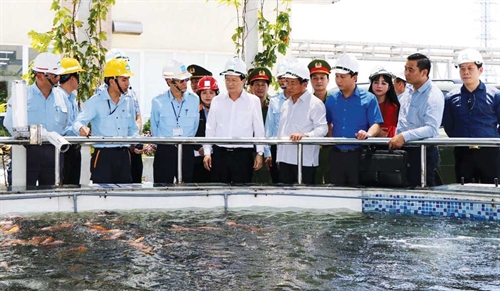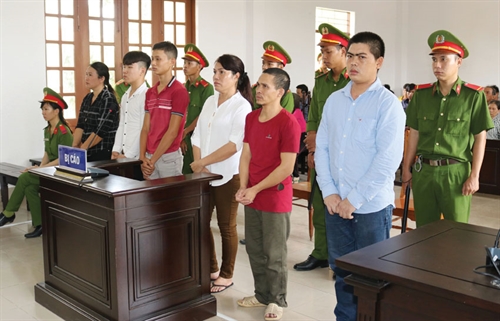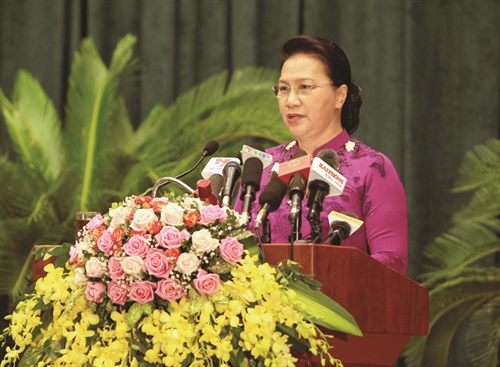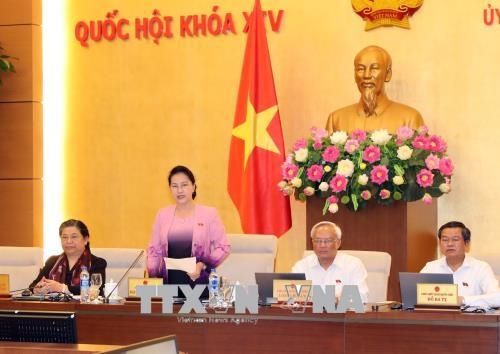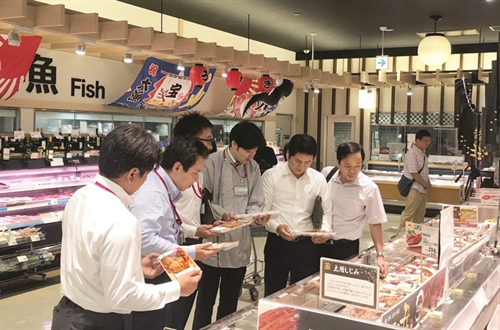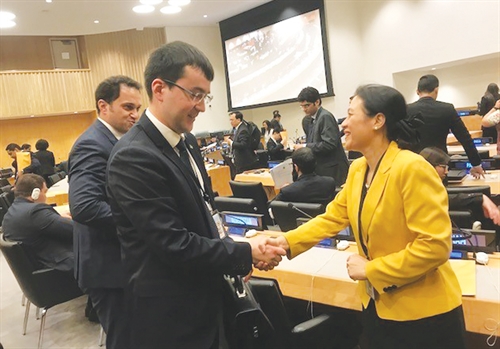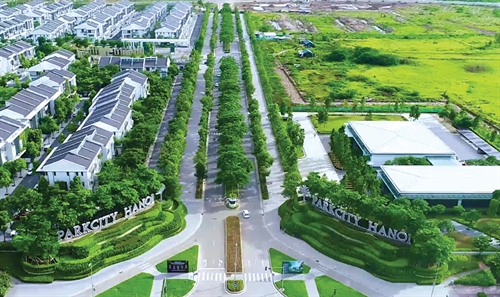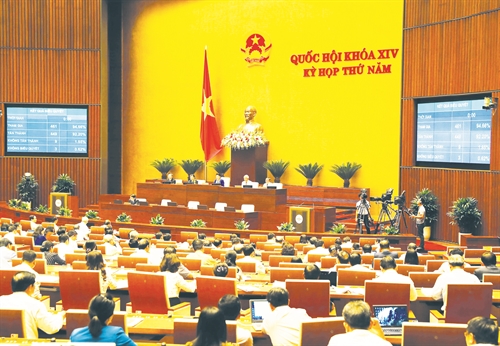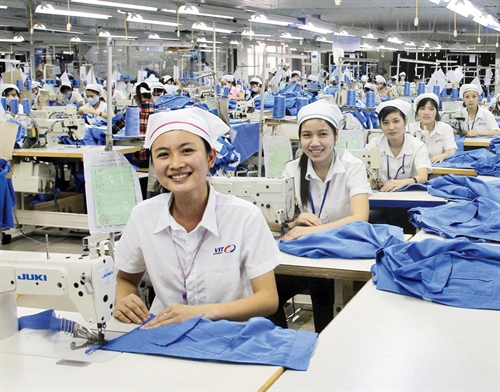The fourth Industrial Revolution increases the demand for skilled workers, resulting in a shortage in the labor market. As the national education system is unable to satisfy the local demand, many countries around the world have adopted policies to attract foreign workers to offset the deficiency. This article analyzes Vietnam’s policies on attraction of foreign workers and proposes policy solutions to lure foreign scientists and technologists to work in the country.
Tran Thuy Hang
Hanoi University of Law
Policies on attraction of foreign skilled workers
Basically, policies on attraction of foreign skilled workers can be divided into three groups: (i) incentive policies to attract foreign workers; (ii) policies on management of foreign workers, and (iii) policies to be offered after foreign workers enter the country. This article analyzes Vietnam’s policies to attract foreign scientists and technologists according to these three groups.
Incentive policies to attract foreign skilled workers
Since 1986 when embarking on the renewal process, Vietnam has consistently implemented the policy to recruit foreign workers only for highly technical jobs which domestic workers are unable to perform.[1] As a result, enterprises, agencies, organizations, contractors and individuals may only employ foreign workers to work as managers, executive officers, experts or technical workers but must put in place programs on training Vietnamese employees to replace such foreigners.
Preferential policies towards foreign skilled workers are provided in Prime Minister Decision 119 dated October 1, 2009, promulgating the Regulation applicable to foreign experts engaged in implementing programs and projects funded by official development assistance (ODA), and Government Decree 87 dated September 22, 2014, on attraction of overseas Vietnamese and foreign scientists and technologists to participate in scientific activities in Vietnam.
Article 1 of Decision 119 defines foreign experts as persons who do not hold Vietnamese citizenship and enter Vietnam to provide professional or technical consultancy services or perform other tasks to serve the study, formulation, appraisal, monitoring, evaluation, management and implementation of ODA programs or projects under international agreements on ODA signed between competent Vietnamese and foreign agencies.
Under the said Decision, foreign experts and their accompanying family members are entitled to visa, foreign exchange, residence registration, travel and personal income tax incentives as follows:
- Visas: They are granted multiple-entry visas at the request of ODA program or project managing agencies. Those who intend to work and stay in Vietnam for at least six months may be granted multiple-entry visas for the maximum working period of three years.
- Foreign exchange: They may carry along foreign currencies into Vietnam under relevant Vietnamese regulations, convert into foreign currencies and bring out of Vietnam their salaries and remunerations for the implementation of ODA programs or projects and other lawful incomes.
- Residence and travel: They may freely travel and register their residence in the Vietnamese territory, except restricted areas.
- Incentives in the grant and conversion of driver licenses and vehicle plate number registration; exemption from import duty, value-added tax, excise tax and registration charge; exemption from personal income tax[2] on salaries and remunerations for the implementation of ODA programs or projects; exemption from personal contributions to public welfare, security and national defense of Vietnam; exemption from registration of professional practice, practice licenses and work permits.
Following the enactment of the 2013 Law on Science and Technology, the Vietnamese Government issued Decree 87 dated September 22, 2014, on attraction of overseas Vietnamese and foreign experts to participate in scientific and technological activities in Vietnam. As per this Decree, these experts may enjoy the incentives provided in this Decree if they meet any of these conditions: (i) having patents or plant varieties registered for intellectual property rights protection or outstanding scientific and technological research works suitable to scientific and technological tasks performed in Vietnam; (ii) possessing a doctoral degree and having been lecturing or conducting scientific research or technology transfer at prestigious overseas research institutes in professions suitable to scientific and technological tasks performed in Vietnam; and (iii) possessing a doctoral degree and having worked for over three years as researchers under international scientific and technological cooperation programs or projects or in research sections of prestigious overseas enterprises.
These experts and their family members (parents, spouses and under-18 children) are entitled to grant of multiple-entry visas or temporary residence cards with the maximum duration as provided by the law on exit, entry and residence of foreigners in Vietnam. Those who are conferred with orders or state honor titles by the Vietnamese State or are temporarily residing in Vietnam may be considered for grant of permanent residence cards.
When working in Vietnam, they may be hired to manage science and technology institutions or scientific and technological tasks and enjoy salaries agreed upon on the basis of the priority level, nature and importance of scientific and technological tasks and their professional capability as well as effectiveness of their contributions. They will be provided with houses or subsidies to rent houses during their working periods in Vietnam, while their family members are entitled to procedural support in getting employed or enrolled in schools in Vietnam.
They may be granted work permits within a shortened period of three days after filing a valid application[3].
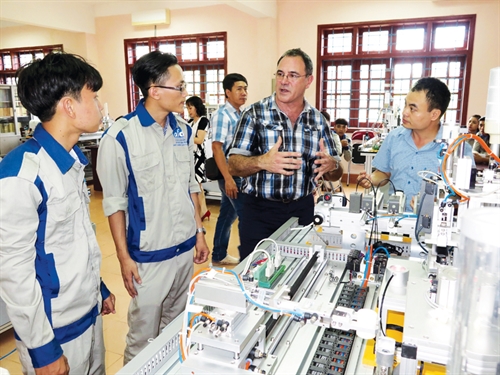 |
| A practical lesson in industrial electricity engineering with a French specialist at Dung Quat Vocational College of Technique and Technology, Quang Ngai province__Photo: Vinh Trong/VNA |
Policies to manage foreign workers
Foreign workers in Vietnam are managed mainly on the basis of work permits, except for those not required to have work permits[4]. A work permit will be granted to a foreign worker who satisfies certain conditions[5], and valid for up to two years[6].
A foreign worker illegally working in Vietnam (without a work permit, with an expired work permit or in contravention of his/her work permit) may face a fine of between VND 1 and 75 million, while his/her employer may be suspended from operation for one to three months[7]. If committing a serious violation, he/she may be expelled at the request of the provincial-level Labor, War Invalids and Social Affairs Department.
Policies to be offered after foreign workers enter to work Vietnam
After entering into a lawful labor contract and getting a work permit in Vietnam, a foreign worker will be considered for grant of a two-year temporary residence permit by the immigration office of the locality where his/her employer is located[8]. With such a temporary residence permit and consent of his/her employer, a foreign worker may invite his/her family members to enter Vietnam to visit him/her and his/her spouse and under-18 children to live with him/her until his/her temporary residence card expires[9].
A foreign worker may apply for a permanent residence card if his/her parents, spouse or children who are Vietnamese citizens permanently residing in Vietnam stand surety for him/her and he/she has a lawful place of residence and stable incomes in Vietnam and has been temporarily residing in Vietnam for at least three years[10]. Once obtaining a permanent residence card, he/she is required to have his/her residence card renewed by the provincial-level Public Security Department once every ten years[11].
Under Vietnam’s 2012 Labor Code, foreign workers in Vietnam are obliged to comply with Vietnam’s labor law and relevant treaties to which Vietnam is a contracting party and protected by Vietnamese law[12]. Since Vietnam has not yet acceded to the International Labor Organization’s and the United Nations’ conventions on migrant workers, the protection of foreign workers is based on Vietnamese regulations and bilateral labor cooperation agreements with foreign countries.
Basically, foreign workers are treated equally as local workers, having the rights and obligations equal to those of Vietnamese citizens, except the right to unemployment insurance and right to establish and join trade union organizations[13].
Regarding social security, foreign workers working under labor contracts of an indefinite term or a term of at least three months are required to buy health insurance with the payable monthly premium equal to 1.5 percent of their monthly salaries. The maximum salary for calculation of health insurance premiums for foreign workers is 20 times the basic salary level[14]. Under the 2014 revised Law on Social Insurance, foreign workers may also participate in social insurance from the beginning of 2018.
Some shortcomings and causes
First, the regulations to attract foreign skilled workers into Vietnam were issued rather late, e.g., 10 years later than China and 20 years later than Singapore.[15] This is because Vietnam began its economic reform in 1986, much later than the time when Singapore started its export-oriented industrialization policy in 1965 and when China launched its economic reform in 1979.
Second, Vietnam has focused on making policies relating to Vietnamese guest workers more than policies to attract foreign workers. Prime Minister Decision 145 issued in 2016 approving the strategy on international integration in labor and social affairs through 2020, with a vision toward 2030, sets forth in Section III.2.b the task of “promoting the labor restructuring and movement of local and international workers, especially sending skilled workers abroad as guest workers”, but makes no mention on the task of attracting foreign skilled workers into Vietnam. This might stem from the reality that Vietnam is a populous country with a high rate of unemployment, mainly among technical workers.[16] However, given the poor-quality workforce and irrational training structure, the sending of local skilled workers abroad as guest workers will worsen the shortage of skilled workers in the country.
The lack of policy orientations has led to the situation that Vietnam has insufficient and unsystematic regulations on attraction of foreign skilled workers as compared to those of other regional countries like Singapore and China.
While Singapore has built a comprehensive legal system concerning foreign workers and applied a regime of granting work permits based on qualifications and skills to foreign workers, Vietnam still applies a single type of work permit for foreign experts performing scientific projects in the country, in addition to ordinary work permits granted to foreign workers under labor contracts.
Although having economic conditions and workforce similar to Vietnam, China has applied a system of green cards for attracting talents and introduced clear, consistent policies to attract international students.[17] Up to now, Vietnam still has no clear orientations for attracting international students into the country, who can be a source of high-quality workers for the country.
Third, Vietnam’s legal documents concerning policies to attract foreign skilled workers are merely decrees and decisions, while these policies are just applied to scientific and technological research activities but not production and business activities. Incentives offered by Vietnam are only in the form of simplified administrative procedures, such as shortening the licensing duration or giving a maximum visa term. It still lacks regulations on support services like provision of information on labor market and regulations or health and education services for foreign workers’ children.
Fourth, the regulations on management of foreign workers remain ineffective. Many foreigners still work without permits or work in contravention of their permits. This can be attributed to the light punishment imposed on illegal foreign workers and their employers. The most severe penalty on foreign workers is expulsion, which has the disadvantage of being costly, thus placing a burden on the state budget. Meanwhile, an employer faces the highest fine of VND 75 million and suspension of operation for between one month and three months. Many enterprises are ready to pay this tiny fine and repeat their violations. The application of the sanction of suspension from operation is rare because it affects other workers, including Vietnamese.
Fifth, regarding the protection of foreign migrant workers, Vietnam has basically adhered to the principles of “non-discrimination” and “national treatment” in the spirit of such international conventions as the International Labor Organization’s Convention No. 143 on Migrant Workers and the United Nations’ International Convention on the Protection of the Rights of All Migrant Workers and Members of Their Families. This is shown through allowing foreign workers to be covered by health insurance and social insurance from this year. However, there remains inequality between foreign and Vietnamese workers when it comes to the regulation that foreign workers in Vietnam may not found or join trade union organizations. This is because in Vietnam the trade union is a socio-political organization and a member of the political system of Vietnam so it cannot admit non-Vietnamese citizens.
So, the above problems are hampering the effectiveness of the policy to attract foreign skilled workers into Vietnam. In the context that the fourth Industrial Revolution boosts the demand for skilled workers, it is necessary for Vietnam to selectively attract foreign workers to work in the country, especially foreign scientists and technologies, absorb modern knowledge and acquire advanced technologies from abroad.
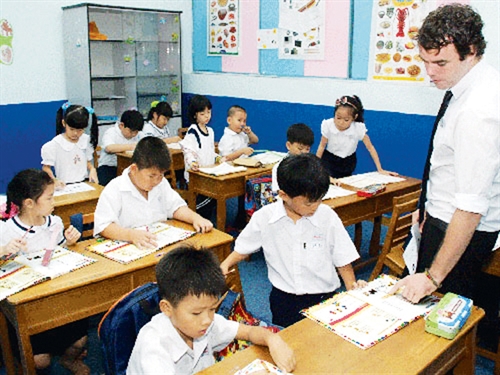 |
| Pupils of Minh Dao Primary School, District 5, Ho Chi Minh City, learn English with a foreign teacher__Photo: Internet |
Solutions to improving policies to attract foreign skilled workers
Based on foreign experiences in formulating policies and laws to attract foreign skilled workers, it is suggested that Vietnam pay heed to the following issues.
Firstly, the country should build a detailed roadmap in formulating policies to lure foreign skilled workers on the basis of an overall assessment of the population structure and demand of the economy, with specific forecasts about areas where foreign workers are needed, their required skills, nationality, and number. These policies should be associated with the national socio-economic development strategies with a vision of 5-10 years. They must clearly state trades and occupations prioritized for development in a given period, with precise forecasts about labor supply and demand in these trades and occupations, and the number of foreign skilled workers to be recruited.[18]
Vietnam should also develop and apply a system of work cards or work permits to be granted to foreign workers based on their nationality, skills, qualifications and salary levels. This system aims to help the testing of foreign workers’ skills and strictly control the number of foreign workers to best meet the demand of the economy.
Secondly, the policies to attract foreign skilled workers should include social welfare benefits to help these workers and their family members integrate into and contribute to the country. Before deciding to live and work abroad, foreign workers often weigh carefully the host country’s social security policies toward themselves and their relatives.
While Vietnam cannot afford to pay high salaries to foreign workers, the country could provide support services to them at lower expenses, such as founding legal and labor market information centers or teaching Vietnamese free of charge.
Besides, Vietnam should consider joining international conventions on protection of migrant workers. This will help not only supplement regulations which Vietnam’s legal system still lacks but also create a necessary legal corridor for foreign workers to protect their interests and, therefore, feel secure to work and integrate themselves into the socio-economic environment of Vietnam.
Last but not least, the country should enact a separate law regulating the attraction and management of foreign workers in Vietnam, which should conform to the labor law and other relevant laws such as international private law, administrative law, civil procedure law and administrative procedure law.-
